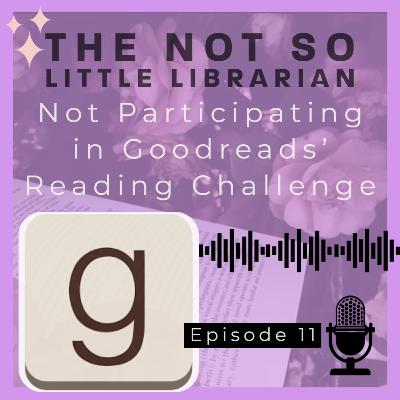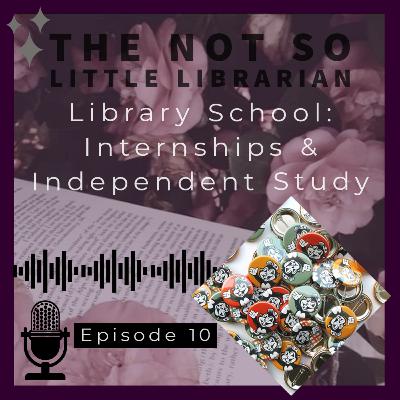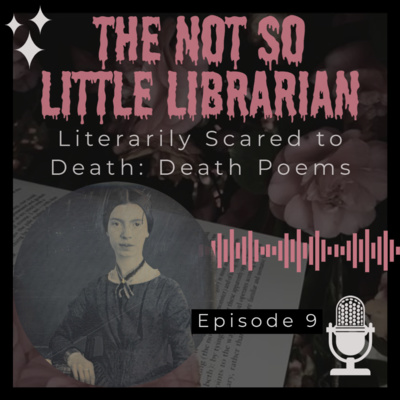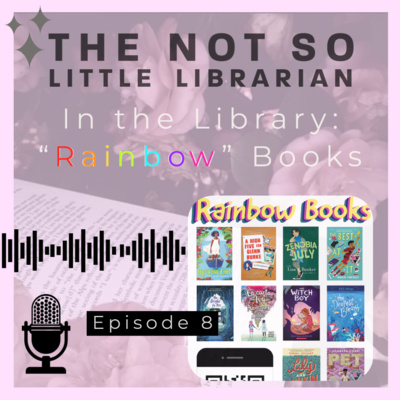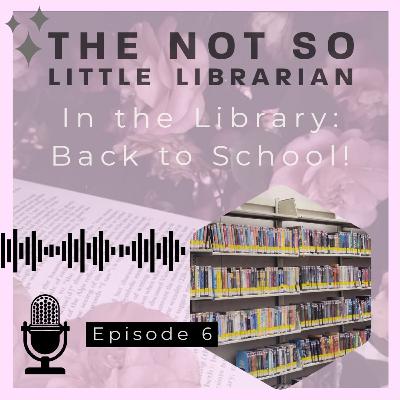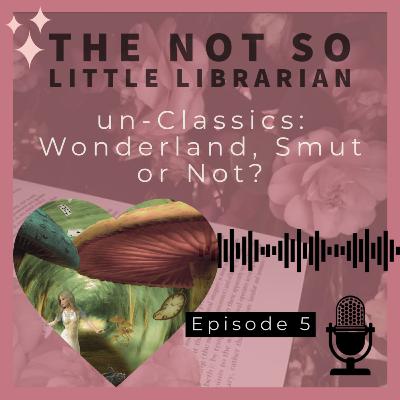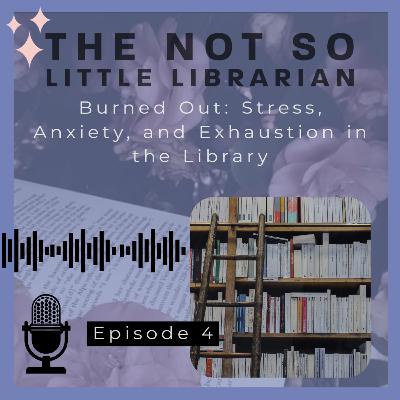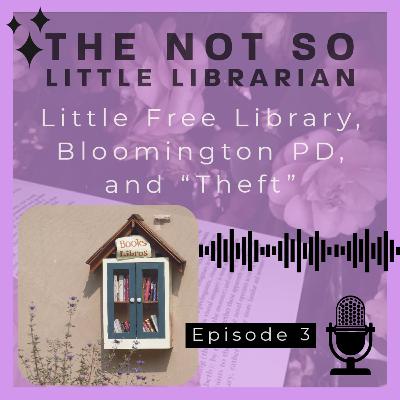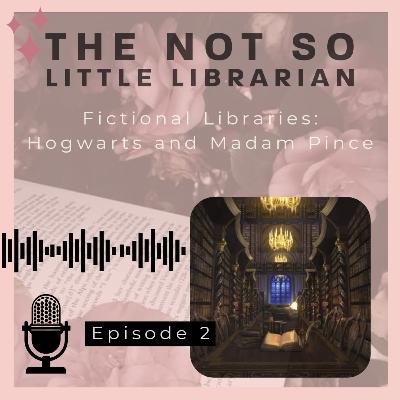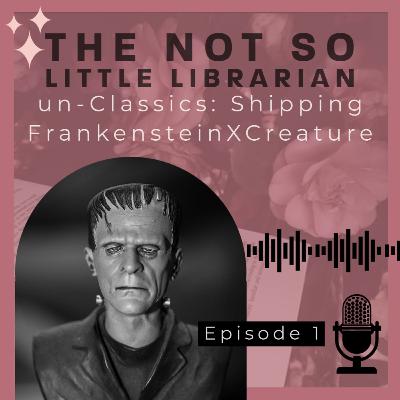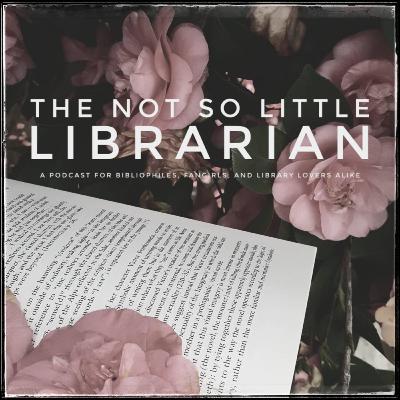Discover The Not So Little Librarian
The Not So Little Librarian

13 Episodes
Reverse
In Margaret Rogerson's Sorcery of Thorns, there are not one but six Great Libraries! Our main character - Elisabeth Scrivener - was raised in the Great Library of Summershill, where she trained to be a Warden of the libraries. In this episode, I go over quotes from Rogerson that detail Elisabeth, Grimoires, Maleficts, and the libraries themselves in this beautifully crafted Young Adult fantasy stand alone novel.
"BUT WAIT, THERE'S MORE!"
US ONLY. As I mention in the episode, I'm hosting a giveaway tied to this episode and Sorcery of Thorns. To enter for a chance to win a signed Owlcrate edition with an exclusive cover, I'll be accepting screenshots (DM on Twitter or Instagram @LitLibraryCast or email to thenotsolittlelibrarian@gmail.com) of either a follow on the podcast streaming platform of your choice or of a review/rating on either Spotify or Apple Podcasts. I'm trying to make it accessible to anyone who would like to enter, so if this doesn't work, reach out to me through one of the abovementioned options.
Music
Summit - by Jonny Easton Link: https://youtu.be/ZH5B_C8r9Dk
"You read how many books?!" Goodreads - one of my favorite apps that I've ever downloaded - has an annual reading challenge. In the past, I've participated and enjoyed it. Last year, though, it was a bit tougher on me mentally as the months started getting colder and the number of books I'd read was still less than half of what I'd planned. While the Goodreads challenge is something that many people look forward to, I decided to explain in this episode why I'm not participating this year (2022). In addition, I talk about points brought forth by others before me and commentate on their opinions regarding Goodreads' annual reading challenge.
If you want to challenge yourself but don't want to attach a total number, there are other options! In the last half of this episode, I talk about some other the alternatives to a numbered challenge for the year. Whether you're a solo reader or enjoy discussions with others, there are alternate options for everyone!
References
Beck, J. (2019, June 6). The adults who treat reading like homework: No one's making them try to read 100 books a year. The Atlantic. https://www.theatlantic.com/education/archive/2019/06/do-people-finish-their-goodreads-reading-challenges/591184/
Feathers, K. (2020, October 20). The ultimate problem with reading challenges: And how to make them healthy. Books Are Our Superpower. https://baos.pub/the-ultimate-problem-with-reading-challenges-1ed7663c029b
Kath. (2021, December 29). Why I'm setting a lower reading goal next year. Book(ish) Podcast. https://www.bookishpodcast.co.uk/blog/why-im-setting-a-lower-reading-goal-next-yearnbsp
(Instagram: @wearebookishpod and @bookishkath)
Packer, K. (2019, September 18). Why my Goodreads book challenge makes me sad. Book Riot. https://bookriot.com/why-my-goodreads-book-challenge-makes-me-sad/
After 2 months away from the microphone, The Not So Little Librarian podcast is back with another episode in the Library School series which covers my subjective experience completing both an online internship and an independent study student assistantship while in SJSU iSchool's MLIS program.
The remote internship I completed for Chicago's Busy Beaver Button Museum took place in Summer 2020 at the height of the pandemic lockdown. To be completely honest, my experience was positively influenced by stay-at-home orders; the internship was the only thing that I had planned for the Summer, so both my husband and I were able to shift our schedules so that I was working on the internship typically between midnight to 5 AM. That being said, I discuss the internship objectively, as well - how the course operated, the types of tasks that I was assigned, and how I went about completing work for the museum's website. As mentioned in the episode, I wrote one blog post for the museum - "New York's 'Women in Business' Week with Phyllis Yvonne Reed." Additionally, there are a couple buttons that I mentioned throughout that section of the episode, but I'd like to highlight a couple (whether mentioned or not) that I think you may find interesting: Women for Racial and Economic Equity, Rutles Drums, and Cocoon Movie. Lastly, here is the link to the back-end assignment that I completed for credit through SJSU - Day in the Life | Busy Beaver Button Museum Virtual Internship.
The independent study course that I took in grad school was completing a student assistantship that focused on building upon and reviewing the content of a closed website designed by past students for a 1 unit elective course studying incunabula - books printed using moveable metal type on the Gutenberg printing press (1451-1501). While I try to avoid talking too much about the actual content of the course (as that's planned for a future episode!), I talk about how I went about researching the topic and what I took away from the experience. If you're interested in learning about incunables and Gutenberg, I definitely recommend watching Stephen Fry's documentary: The Machine That Made Us.
If you have any questions about either details of either the internship or independent study, advice on filtering through options, or anything else you may want to reach about to me about, please email me at thenotsolittlelibrarian@gmail.com or find me on Instagram and Twitter at @LitLibraryCast!
Join me and my special guest, Cal, as we read some of my favorite poems about death. While this should be quite the somber episode, it's anything but! With California on fire and the air quality slowly killing my asthmatic self who is waiting on a replacement inhaler, the coughing and horrible jokes should make this an interesting one for any listener - even those scared by the concept of death and facing one's own mortality.
Poems Read:
"Because I Could Not Stop for Death" by Emily Dickinson (1890)
"Death Be Not Proud" by John Donne (1633)
"Do Not Go Gentle Into That Good Night" by Dylan Thomas (1951)
"Ozymandias" by Percy Shelley (1818)
Sonnet 71 by William Shakespeare (1609)
"Out, Out-" by Robert Frost (1916)
"Dulce et Decorum Est" by Wilfred Owen (1920)
"Do Not Stand at my Grave and Weep" by Mary Elizabeth Frye (1932)
"Annabel Lee" by Edgar Allen Poe (1849)
"When I have Fears That I May Cease to Be" by John Keats (1848)
"The Darkling Thrush" by Thomas Hardy (1900)
What's a "rainbow" book? Exactly what you'd think! Rainbow books are books that feature LGBTQ+ representation. In the junior high school library where I work, I've found that there is a need for a list of these books. While not all students may be comfortable asking for recommendations in this category, there are definitely those who are! I'm excited to continue working on the Rainbow Books list.
If you know of any rainbow books that are middle grade interest level, please send me a message; I'm on Twitter (@LitLibraryCast), Instagram (@LitLibraryCast), and Gmail (TheNotSoLittleLibrarian@gmail.com). If you've done something similar in your library or have an idea that you'd like to share, I'd be more than happy to hear that, as well!
In this slightly more raw (audio-wise) episode, I discuss my experience taking on leadership roles in an online graduate school program. Briefly, I talk about my time as the social media coordinator for the First Generation Student Group before diving in deeper on my previous job as the Editor-in-Chief of the SJSU iSchool's Student Research Journal. To read the journal or to submit a piece for consideration, visit the SRJ's website.
Scholarworks.sjsu.edu/ischoolsrj/
After a summer of freedom and sleep, I went back to work in the middle school library. In this episode, I discuss some of the prep work that my coworker and I had during our first week back, as well as some of the plans that we have for the year! In particular, I'm super excited for the 10-genre challenge to celebrate students being back at school and the genrification of the library - a project that was undertaken and completed just before I started working there. (It's absolutely beautiful and so easy to browse!)
If you have any experience or know of some media (YouTube videos, podcasts, Instagram pages, etc.) that share experiences with leading middle grade book clubs, please reach out! I would love some tips and advice on how to proceed with my big project for the year - something that I'm both looking forward to and dreading simultaneously because of social anxiety. Wish me luck?
Welcome to Wonderland - the place where writers throw characters from Lewis Carroll's 1865 Alice's Adventures in Wonderland in absurd (and sometimes sexy) situations to reimagine a childhood classic!
For this episode, Cal joins me in a wonderous guessing game. For a chance to earn 3 points per book (of which there are 13 in total), here's how it works:
- With only the title and author, he guesses whether or not it's smut
- After, he guesses one element or predication about the story before hearing the synopsis
- Finally, Cal guesses whether or not I have read the book after hearing the synopsis (courtesy of Amazon descriptions)
Feel free to play along! Tally up your points and share your score with me either via Twitter or Instagram (@LitLibraryCast). See if you can beat Cal's score.
WARNING!: This episode is not for those who do not want to hear swearing, smut, and similar vulgarity from a couple who have no problem not holding back!
With everything that's been going on during the last year and a half, it's understandable that many people (including myself) are stressed. What amplifies that stress into full-on anxiety, though? Job hunting.
In this episode, I talk about some of my recent anxiety regarding job searching and ways that I combat stress and anxiety.
Lastly, so as not to end on a rather hopeless note, I briefly talk about a book that I read recently... Pure blue alien smut. Sound familiar? Its cover and title have appeared all over online after viral a TikTok-er discussed the book in one of her videos. Stay tuned until the end to hear about why I absolutely did not hate this book!
In case you missed the viral tweets from the official Bloomington Police twitter account (@BPD_MN), here's a recap of what happened and why it's important to address.
On Friday, July 2nd, Bloomington PD tweeted a photo of two police officers standing with a LFL steward and a restocked LFL with the caption, "After some thefts from little libraries in our city, officers and staff came together to donate a bunch of books to the libraries. Now people can use and enjoy them again!" As you might imagine, people were quick to go on the offense, pointing out that one cannot steal from a Little FREE Library. A couple hours later, BPD tweeted again with an explanation that entirely missed its mark: "An individual was taking every book from the libraries. It is common that they are then sold for profit which is not the intent for the libraries." It took an additional two hours before the official Twitter account issued an apology tweet: "Regrettably, in our previous post we used the word theft to describe books being taken from a free library. We did not investigate this as a theft nor take a report. We simply responded by donating books that our BPD staff brought from home. A human error. Have a safe weekend."
In this episode, I read some of the responses by the public that are both insightful and hilarious. Besides a misuse of wording, though, Twitter user Tressie McMillan Cottom (@tressiemcpdd) links to the following article, which shines light on the more monetary and less literacy-advocacy side of the Little Free Libraries non-profit organization.
Schmidt, J., & Hale, J. (2017). Little Free Libraries: Interrogating the impact of the branded book exchange. Journal of Radical Librarianship, 3. https://journal.radicallibrarianship.org/index.php/journal/article/view/17
How many Hogwarts facts can a married couple - who bonded over Harry Potter while dating - mess up? Several, apparently.
Join us as my husband (Cal) and I talk about one of my favorite fictional libraries to kick off the start of a series of fictional libraries - the Hogwarts library! What would a library be without its overly cranky, controlling, stereotypical librarian, though? Certainly a fictional librarian working in one of the most magical places on earth would NEED to be depicted as creepy and rude... It only makes sense.
As we mention, it's been years since we both read the series all the way through. That being said, there will definitely be some mistakes - sorry, Slughorn! I promise I knew what section you taught before, but it just slipped my mind!
Articles Referenced
Reel Librarians. (2012). Harry Potter and Madam Pince: How the Hogwarts librarian is depicted in the Harry Potter books. https://reel-librarians.com/2012/12/04/harry-potter-and-madam-pince/
Monaghan, O. (2019). Harry Potter in the library. Grains of Knowledge. https://library.blogs.lincoln.ac.uk/2019/12/09/harry-potter-in-the-library/
Mary Shelley's 1818 novel, a few passages dramatically read, and a homoerotic interpretation of Victor Frankenstein and the Creature's relationship - what more could you want from a first episode?
As mentioned in this episode, my analysis was conducted while studying English literature at university; my thesis was grounded in a thorough literature review of research with similar concepts. I do not claim that my interpretation is original or that it is "correct." The interpretation is purely literary and not meant to fetishize the novel or either character. Additionally, there are a couple sections where my timeline of the novel was skewed, but my view of the passages noted is not affected by these timeline slippages! (Apologies regardless for the timey-wimey-ness.)
Several References for Consideration and Further Reading
Dobson, T., & Luce-Kapler, R. (2005). Stitching texts: Gender and geography in Frankenstein and Patchwork Girl. Changing English, 12(2), 265-277.
Fan, F., & Stryker, S. (1994). My words to Victor Frankenstein above the village of Chamounix: Performing transgender rage. A Journal of Lesbian and Gay Studies, 1(3). Duke University Press.
Haggerty, G.E. (2016). What is queer about Frankenstein? In A. Smith (Ed.) The Cambridge Companion to Frankenstein (pp. 116-126).
This short pilot episode introduces listeners to myself (the not so little librarian) and mentions some of the topics that I'll be discussing weekly.



